Stay in the know on all smart updates of your favorite topics.
Arnhem food cooperative with Amsterdam roots

In 1901, sixteen dairy farmers in the vicinity of Amsterdam, decided to establish the "Ilpenstein" cheese factory. My grandfather, Piet Nieuweboer, was one of the directors of the cooperative. The reason for collaboration within the cooperative? Cheesemaking traditionally takes place at the farm itself. The cheese factory made it possible to use innovative cheesemaking techniques. Even more important was the collaboration to improve the distribution and marketing of the cheese towards customers.
With the course "Biologisch Tuinieren in de Stad", we have trained almost two hundred new urban farmers in the city of Arnhem. Organic urban farmers with a food garden of half a square meter till half a hectare. It is a dream that these organic urban farmers, and others, will eventually find and learn from each other. Our initiative is the establishment and growth of the "Biologische Stadsboeren Coöperatie Arnhem Groen". An organic urban farmers' cooperative focused on economic collaboration in a green Arnhem.
Sensemakers Workshop DIY Smart Glasses

During this evening Paul Stefaan Mooij will introduce the DIY Smart Glasses he developed, he is bringing several 'arms'. The PMSG kit lets you swap out those boring old arms from your (sun)glasses for a custom-made PCBA that looks and functions like something a hacker MacGyver would dream up. It fits just like the original—using the same hinges, screws, and probably duct tape somewhere—but now you’ve got space for sensors, connectors, and all the IoT magic you can pack onto your temples.
Join us to experiment, learn and envision new sensors and possibilities.
https://www.hackster.io/psmooij/pmsg-prototype-modular-smart-glasses-8bd4e6
https://github.com/Control-C/PMSG
For more info and rsvp: https://sensemakersams.org/events/
The workshop is from 19-21h in the Makerspace of the OBA and you can also just walk in!
OBA: Oosterdokskade 143, 1011DL Amsterdam
Sensemakers X-Mas Workshop

For our end-of-the year event we have some extra opportunities to build, create and even program your own souvenir to take home!
Please if you want to make and take home the Xmas lights you see in the picture, the kit costs 25,- (we also have 2 Pay-It-Forward kits). Of course you can also work in other small projects or 3D print a small Xmas tree or make (for children!) a self designed wooden lamps!
You don't have to rsvp via meetup, the workshop is from 19-21h in the Makerspace of the OBA and you can just walk in!
OBA: Oosterdokskade 143 1011DL Amsterdam
Everything Urban 001_Interactive Talk for students and young professionals

Everything Urban 001 (LinkedIn Event) is the first in the Interactive Talk series for students and young professionals interested in Urban Affairs i.e. urban planning, urban management, architecture, sustainability, smart cities, to name some. Feel Free to attend it on September 4, 2025. More details in the link.
“We’re not just creating technology for cities—we’re creating better cities for people.” From Global Goals to Local Action: How Amsterdam Is Building a Smarter, Fairer City
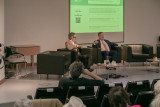
As the world grapples with massive challenges—climate change, rapid urbanisation, digital disruption, and growing inequality—some cities are not waiting for top-down solutions. They are rolling up their sleeves and experimenting with new ways to improve life for everyone, block by block. Amsterdam is one of those cities.
That’s why I was proud to share Amsterdam InChanges approach to smart, inclusive urban innovation at the #CIPPCD2025 conference in Aveiro.
Through our open innovation platform, <strong>Amsterdam InChange</strong>, the city has become a global leader in turning lofty global ambitions into practical, local action. But Amsterdam’s model isn’t built around flashy tech or utopian blueprints. Instead, it’s grounded in an essential question: How can we use innovation to improve people’s everyday lives?
Local Action for Global Challenges
Amsterdam understands that the climate crisis, digital transition, and social inequality can’t be solved by government alone—or by technology alone. That’s why it launched Amsterdam Smart City in 2009 as a public-private partnership. What began as small-scale energy-saving pilots has grown into a community of over 8,500 members, coordinating more than 300 projects across the city and beyond.
The approach is rooted in co-creation. Citizens, companies, knowledge institutions, and government actors come together to design, test, and scale solutions that serve the public good. The values that guide the network are clear: people first, openness, transparency, learning by doing, and public value.
The Doughnut as a Compass
Amsterdam was the first city in the world to embrace Doughnut Economics as a guiding framework. The “City Doughnut,” developed with economist Kate Raworth, helps policymakers balance the city’s ecological footprint with the social foundations that all citizens need: housing, education, health, equity, and more. It’s a tool to align every local decision with both planetary boundaries and human dignity.
This framework has inspired circular construction strategies, neighbourhood energy co-ops, and more inclusive procurement policies. It shows that global concepts can become real when grounded in local practice.
Making Innovation Inclusive
One of Amsterdam’s core beliefs is that smart cities must be <strong>inclusive cities</strong>. That means tackling issues like <strong>mobility poverty</strong>, where rising transport costs and digital-only services make it harder for low-income or elderly residents to get around.
Through the <strong>Mobility Poverty Challenge</strong>, Amsterdam partnered with the Province of North Holland and researchers from DRIFT to understand where and how exclusion occurs—and to design better public mobility systems. Pilot ideas like a “Mobility Wallet” (a subsidy for essential travel) and more inclusive digital apps emerged from real conversations with affected residents.
The same inclusive mindset guides Amsterdam’s digital transformation. In the suburb of Haarlemmermeer, officials flipped the script on e-government. Instead of asking citizens to become “digitally skilled,” they asked how government systems could become more <strong>humane</strong>. This led to simplified interfaces, better access to services, and ultimately more trust.
Responsible Tech and Energy from the Ground Up
Tech transparency is another pillar of the Amsterdam model. The city runs the world’s first <strong>Algorithm Register</strong>, giving the public insight into how AI and automated systems are used in services—from traffic enforcement to housing applications. Anyone can access this register, offer feedback, and better understand how digital decisions are made.
In the energy space, the city supports both bold innovation and careful upscaling. At the <strong>Johan Cruijff ArenA</strong>, used electric vehicle batteries store solar energy, powering concerts and matches with clean backup power. At the same time, a coalition of partners led by Amsterdam InChange is working to scale up Local Energy Systems by collecting lessons learned and creating a toolkit for community-led energy.
What Makes It Work?
If there’s one secret to Amsterdam’s success, it’s the governance model: small, neutral facilitation teams guiding large multi-stakeholder coalitions, anchored by public trust and shared purpose. Regular Demo Days allow project teams to showcase progress, get feedback, and adapt. This culture of transparency and iteration helps avoid the so-called “innovation graveyard,” where pilot projects go to die.
The city also embraces failure—as long as it’s shared and learned from. Reports like “Organising Smart City Projects” openly list lessons, from the importance of strong leadership to the need for viable business models and continuous user involvement.
An Invitation to Other Cities
Amsterdam’s smart city is not a blueprint—it’s a mindset. Start with your biggest local challenge. Bring the right people together. Make space for experimentation. Build bridges between local and global. And, above all, put citizens at the centre.
As international smart city ambassador Frans-Anton Vermast puts it: “We’re not just creating technology for cities—we’re creating better cities for people.”
The III International Conference on Public Policies and Data Science
Outdoor Office Day 2025
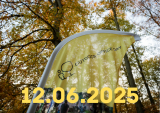
On June 12th 2025 we will celebrate the 7th edition of the international Outdoor Office Day. It’s an open invitation to take your work outside, reconnect with the surrounding urban nature around your office.
This year’s theme is 'Connecting with each other’: with your direct colleagues, colleagues from other departments, neighbours, or external relations. Please join the growing network of individuals and companies that take their work outside more and more often. Get inspired whilst you spend time surrounded by urban nature. This enhances new and meaningful relationships, stimulates the flow of good ideas and supports the forging of valuable collaborations.
Please meet our partners and participants:
https://www.outdoorofficeday.nl/participants
If in Amsterdam we invite for wanderwalk with sustainable leaders. Join us in Amsterdamse Bos to discuss your dilemma's, learn from each other and connect.
Vacancy: PhD position on The Organization of Innovation for Sustainability Transition at Vrije Universiteit Amsterdam
Have you obtained a master's degree in social and/or organization sciences, and would you like to study innovation and change? Then consider joining our interdisciplinary team with a PhD research on accelerating sustainability transitions!
This PhD position is part of an interdisciplinary team of three PhD researchers, one postdoc, and two senior researchers in the project ‘EXTRA’: <em>From EXperiment to sustainable change: TRAnsformative methodologies for innovation and learning</em>. EXTRA is a collaboration between multiple universities and public and private partners to research and advance physical and experimental environments as enabling methodologies for learning and innovation, also known as living labs.
Living labs are applied by various change-makers, including governmental actors, industry partners, NGOs, researchers, and citizens, to co-create innovations. However, while much experimentation and innovation occur, achieving long-term systemic change remains difficult. Therefore, the main purpose of EXTRA is to amplify the transformative power of living labs with novel insights, instruments, and human capacities, thus enabling change-makers to make sustainable changes and societal impacts.
In the consortium this PhD research will focus on the organization of innovation to accelerate sustainability transition. More specifically, by gathering knowledge and analyses across different fields and cases, this research will identify and validate (inter)organizational approaches, interventions, and business models to overcome barriers and enable the public-private collaboration needed for embedding, translating, and scaling innovations.
For more information about the project, please visit: https://www.nwo.nl/nieuws/financiering-voor-onderzoeksproject-over-fysieke-experimentele-omgevingen ; https://www.tudelft.nl/2024/bk/nwo-financiering-voor-innovatief-onderzoek-naar-fysieke-experimentele-omgevingen.
PhD translation: Capturing change in the energy transition and beyond (with Tessa de Geus)
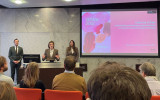
(this event is in Dutch)
De actie-onderzoekers van DRIFT werken jarenlang aan hun proefschrift en ontwikkelen daarmee state-of-the-art kennis en tools. Traditioneel gezien wordt deze kennis echter alleen ontsloten in boekvorm en overgedragen aan hun commissie van (hoog)leraren. Daarom organiseren we naast een PhD-verdediging een PhD-vertaling.
Op 11 april is de beurt aan Tessa de Geus. We duiken in haar proefschrift ‘Capturing change’ (<em>verandering vatten).</em> Het onderwerp: verschillende vormen van ‘capture’ in de energietransitie – krijgen radicale nieuwe initiatieven of ideeën de wind eronder zodra ze zich op een groter speelveld begeven of raken ze vleugellam?
Hoewel de term buiten de transitiewetenschap (nog) niet zo bekend is, is ‘capture’ een heet hangijzer voor wie werkt aan fundamentele maatschappelijke verandering. Denk aan een overheid die een burgerinitiatief ondersteunt of eigen innovatieve praktijken opschaalt – in grote veranderingsprocessen als de energietransitie is veel hoop gevestigd op zulke nieuwe bestuursvormen, maar is weinig bekend over de schaduwzijde ervan, stelt Tessa.
Net als bij de PhD-verdediging beginnen we met een ‘lekenpraatje’ — Tessa legt in begrijpelijke taal uit wat ze heeft onderzocht en welke conclusies en aanbevelingen daaruit volgen.
Daarna openen we het gesprek. Onze drie panelleden stellen zich kort voor en dan gaan met de promovendus in gesprek over vragen als: wat betekenen jouw uitkomsten voor mijn beleid, bedrijf of activisme? Wat herken ik en wat zie ik toch anders? En hoe zouden we opgedane lessen en methodes kunnen toepassen in ons (werk)veld?
Op 11 april kun je van 10:00-11:00 via YouTube live meekijken met dit evenement. Meer informatie vind je op onze website:
PARK27 voor circulaire economie zoekt pioniers!
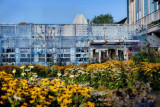
Op Marineterrein Amsterdam transformeert gebouw 027 tot een levend laboratorium. Bureau Marineterrein en gemeente Amsterdam werken samen aan een plan om van deze locatie een bijzondere plek te maken voor creativiteit, circulaire economie en ondernemerschap. Wil jij hier onderdeel van zijn? Dan horen wij graag jouw ideeën!
Binnen PARK27 bouwen organisaties, collectieven, initiatieven en Amsterdammers aan een nieuwe, sociaal rechtvaardige economie binnen ecologische grenzen. In het hart van innovatiedistrict Marineterrein vormt het een ideale omgeving voor experiment en samenwerking.
Voor de invulling van het verdere proces, benodigde ruimtelijke ingrepen en het beschikbaar maken van financiële middelen, vragen we input van partijen die een rol voor zichzelf zien binnen PARK27.
De locatie is 1000 m², is flexibel in te richten en bestaat uit een lobby met sanitaire voorzieningen, drie ruim opgezette werkplekken en een enorme loods in het midden van het gebouw. Ideaal voor een creatieve invulling zoals werk- en maakplekken, een expositieruimte, evenementenlocatie, samenwerking of andere creatieve en innovatieve concepten. De ruimte is minimaal 5 jaar beschikbaar.
Kijk voor meer informatie over PARK27 en de aanmeldprocedure hier: https://lnkd.in/e3ZEbZTB
Reflexive Monitoring course
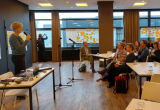
If you're working on system change, you will face plenty of uncertainty and polarisation. The outcome is also unpredictable: we're working on a different future, but we don't know exactly what that will look like. And systems change requires an integrated approach, as different aspects - from technology to politics - have to change simultaneously. So in transitions, merely setting and hitting targets won't do.
This 3-day, Dutch-language course introduces you to valuable knowledge, tools and approaches, aimed at learning and adapting in transitions – for all transition makers who want to improve their monitoring game. It's taught by Barbara van Mierlo, associate professor at Wageningen University & Research and a founder of the methodology 'Reflexive Monitoring in Action' as well as PJ Beers, senior researcher at DRIFT and lecturer at HAS Green Academy.
Sign-up for 2025 is now open.
Open call: 54 tech-for-good challenges with funding available for over 60 pilots

CommuniCity's third Open Call is now launched! 🚀
We are pleased to launch the final CommuniCity Open Call round. There will be over 60 pilots running across Europe, focusing on digital inclusion and wellbeing for marginalized communities. 7 challenges are focused on citizens of Amsterdam.
In addition to the partner cities of Helsinki, Porto, and Amsterdam, the Replicator Cities are also presenting their unique challenges. The Replicator Cities are Aarhus, Bruges, Brussels, Cuneo, London, Manchester, Matosinhos, Milazzo, Plock, Prague, Sant Boi de Llobregat, Sarajevo, The Hague and Utrecht.
💡 Tech providers: Apply for grants of up to €12,500 to develop tech solutions and run real-life experiments in collaboration with the cities. The deadline for applications is October 31st, 5pm CET.
More information on the Open Call: https://lnkd.in/e-Z5EA5z
Let’s shape the future of our cities together! 💪
Innovation Dinner - Materialen
🔔 Het Innovation Dinners seizoen is weer van start! 🔔
Op woensdag 16 oktober is de aftrap van ons nieuwe seizoen! Dan organiseren Bouwlab en 3D Makers Zone vanuit het programma van EDIH weer de bekende Innovation Dinners.
We gaan verder met het inspirerende thema waar we gebleven waren: <strong>Materialen</strong>.
Deze keer verwelkomen we twee experts die hun visie delen over de toekomst van klimaatneutrale materialen en innovatieve bouwtechnieken:
<strong>Jan Willem Slijkoord</strong>, entrepreneur in klimaatneutrale materialen en moleculaire recycling van plastics, deelt zijn visie op het oplossen van het verpakkingsafvalprobleem. Wat is het échte probleem, en hoe kunnen we composieten recyclen en ontmantelen?
<strong>Eric Geboers</strong>, oprichter van <strong>Concr3de</strong>, vertelt over hun revolutionaire technieken voor het 3D-printen van steen en hout. Geen houtgranulaat, maar een volledig nieuwe methode met veelbelovende resultaten!
📅 <strong>Wanneer</strong>: Woensdag 16 oktober, 17:30 - 20:00
📍 <strong>Waar</strong>: 3dmz / Bouwlab, Oudeweg 91-95, Haarlem
🎟️ <strong>Deelname</strong>: Kosteloos
Schrijf je nu in via https://bouwlab.com/innovation-dinner-materialen/ of mail sem@bouwlab.com bij vragen.
We kijken ernaar uit om je te verwelkomen! 🙌
Coliving Conference 2024

The premier conference accelerating the future of shared living.
Join forces with industry leaders, fuel innovation and exchange coliving expertise at the annual 2-day hybrid conference in Amsterdam.
Join us in Amsterdam on 25 & 26 September 2024 for the Coliving Conference, an immersive two-day event powered by Coliving Ventures. In celebration of its second edition, connect with coliving and shared living enthusiasts, forward-thinking entrepreneurs, seasoned investors, and esteemed industry leaders as we continue to shape the future of shared living.
Gain exclusive insights, forge valuable connections and ignite your passion for shared living in a collaborative environment. Immerse yourself in interactive sessions, product showcases and panel discussions while experiencing the vibrant city of Amsterdam.
Don't miss this opportunity to be part of the growing coliving movement and unlock the true potential of shared living.
You may get your ticket here:
https://www.colivingconference.com/
We offer Student & Academic Staff discounts. For more information email us at: conference@colivingconference.com
YIMBY Harvest Festival
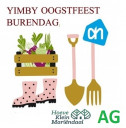
YIMBY Arnhem! is a bottom-up movement aiming at small scale food growing in the city of Arnhem (NL). The 10 ten years of green YIMBY Arnhem! experience shows the fun and cooperation of urban growing food. The YIMBY experience also shows that in time small initiatives grow to major results in empowering green people in the city.
<strong>Green stewardship</strong> More than 50% of the European population currently lives in urban areas, a proportion that is projected to increase to almost 70% by 2050. Distributed small scale urban food growers can together make a difference in providing healthy food in cities, in a climate neutral and sustainable way. The city of Arnhem has the potential to grow 10% of the vegetables and herbs in 2050,
metaCCAZE - Summer Mobility Talks

Onder het genot van een hapje en drankje organiseren we vanuit het EU Horizon project metaCCAZE op 30 juli de Summer Mobility Talks. Met iedereen die nog niet op vakantie is, gaan we in gesprek over thema’s als autonoom varen, mobility credits, Intelligent Speed Adaptation en multimodale logistiek. De Summer Mobility Talks is een informele bijeenkomst voor iedereen die het leuk vindt om ideeën uit te wisselen over mobiliteit in de stad, én eenmooie gelegenheid om te netwerken.
Vanaf 15:30 uur staan de drankjes koud.
16:00 uur: korte introductie van het EU Horizon project metaCCaze
16:10 – 17:30: uitwisseling over thema’s en netwerken
Locatie: 027 Garage Marineterrein Amsterdam (Kattenburgerstraat 5, Amsterdam)
Iedereen is welkom om binnen te lopen, maar i.v.m. de catering horen we graag of je komt. Aanmelden kan via het Google Form.
Lees hier meer over het Europese metaCCAZE project.
A Lab POP UP FESTIVAL

Met exposities, live muziek, kunst, theater, fotoreportages, workshops, panel discussies en meer!
Laat je nieuwsgierigheid de vrije loop tijdens het snelste festival van de stad: het A Lab POP UP Festival! Voor alle nieuwsgierige Amsterdammers die in deze schrale tijden kunst & cultuur, duurzaamheid en sociale innovatie hoog in het vaandel hebben. Kom kijken hoe onze ruim 300 members aan een zelfredzame toekomst werken. Kinderen? Neem ze mee, want het wordt een feestje!
Building local mini-economy within planetary boundaries

Scroll naar beneden voor de Nederlandse versie
Growth is an end in itself, dictates the current economic model. For only growth would keep our economy going and be indispensable to further sustainability. At the same time, our planet is being depleted by this drive for green growth.
Is it time to abandon economic growth as a social ideal? And then what are workable, more social alternatives?
More and more business owners are opting for sustainable operations. They settle for less financial gain to do valuable work with positive social and environmental impact. The rise of the commons movement, housing-, energy- and food cooperatives, as well as social initiatives in health and welfare, show that people want to stand together for values other than financial gain.
Achievable and real alternatives
New economic models offer different perspectives for considering the economy as part of a society. They offer tools to make that economy more equitable and sustainable. Yet the new economic thinking is still often dismissed as unrealistic and unachievable. Only by trying out these theories in practice can we demonstrate that these are real alternatives.
New economic thinking, New economic acting
To experiment with new economic theory and models in practice, the Amsterdam Economic Board has started the New Economic Models exploration. In April, we introduced the living lab project “New Economic Thinking, New Economic Acting” at the Marineterrein in Amsterdam. In this we work on socio-economic experiments, together with AMS Institute, AHK Culture Club, And The People, Bureau Marineterrein, Kennisland, The Next Speaker and the knowledge coalition ‘Art, Tech & Science’.
The Marineterrein is the ideal place to do this because it is an official experiment site. Moreover, companies located here are often already working on circular and social projects. Cultural institutions and organisations at the Marineterrein, in turn, can represent what thriving without economic growth could look like and fuel our desire for a new economy.
-----------------------------------------------------------------------------------------------------------------------
Bouwen aan lokale mini-economie binnen planetaire grenzen
Groei is een doel op zich, dicteert het huidige economische model. Want alleen groei zou onze economie draaiende houden en onmisbaar zijn om verder te verduurzamen. Tegelijkertijd raakt onze planeet uitgeput door die drang naar groene groei.
Wordt het tijd om economische groei als maatschappelijk ideaal los te laten? En wat zijn dan werkbare, socialere alternatieven?
Steeds meer ondernemers kiezen voor een duurzame bedrijfsvoering. Zij nemen genoegen met minder financiële winst om waardevol werk te kunnen doen, met positieve sociale en ecologische impact. De opkomst van de commons-beweging, woon-, energie- en voedselcoöperaties en maatschappelijke initiatieven in zorg en welzijn, laten zien dat mensen zich samen sterk willen maken voor andere waarden dan financieel gewin.
Haalbare en reële alternatieven
Nieuwe economische modellen bieden andere perspectieven om de economie als onderdeel van een samenleving te beschouwen. Ze bieden handvatten om die economie rechtvaardiger en duurzamer in te richten. Toch wordt het nieuwe economisch denken nog vaak weggezet als onrealistisch en niet haalbaar. Alleen door deze theorieën in de praktijk uit te proberen kunnen we aantonen dat dit reële alternatieven zijn.
Nieuw economisch denken, Nieuw economisch doen
Om te kunnen experimenteren met nieuwe economische theorie en modellen in de praktijk, verkent Amsterdam Economic Board deze in de verkenning Nieuwe economische modellen. In april introduceerden we het proeftuinproject ‘Nieuw economisch denken, Nieuw economisch doen’ op het Marineterrein in Amsterdam. Hierin werken we aan sociaaleconomische experimenten, samen met AMS Institute, AHK Culture Club, And The People, Bureau Marineterrein, Kennisland, The Next Speaker en de kenniscoalitie ‘Art, Tech & Science’.
Het Marineterrein is de ideale plek om dit te doen, omdat het een officieel ‘experimentterrein’ is. Bovendien zijn de hier gevestigde bedrijven vaak al bezig met circulaire en sociale projecten. Culturele instellingen en organisaties op het Marineterrein kunnen op hun beurt verbeelden hoe bloei zonder economische groei er uit kan zien en ons verlangen aanwakkeren naar een nieuwe economie.
SHARE YOUR STORY AND MAKE AN IMPACT! Participants involving for documenting and mapping Chinese diasporic heritage in the Netherlands

Almost in every metropolitan city in the world exists a Chinatown where Chinese diasporic communities live and conduct commercial activities. In recent years, many countries have started listing and conserving Chinese diasporic heritage as their dynamic cultural resources that represent human migration histories and cultural diversity.
Chinese diasporic communities came to the Netherlands in the early 20th century. The Chinatown in Amsterdam is one of the main Chinatowns in the Netherlands, and is well-known in Europe. However, very few studies in the field of heritage management reveal and discuss the cultural significance (heritage attributes, values from various stakeholders) and management models.
We are researchers from the UNESCO chair in Heritage and Values, TU Delft. We are now looking for participants for a research project on Chinese diasporic heritage in the Netherlands, also called “共同保育我們的唐人街遺產” in Chinese. If you:
- come from a Chinese family with a migration background
- (used to) live in/work in/have emotional connections to Chinatown areas
- would like to share your stories/interests about Chinese diasporic heritage in the Dutch Context
......
Join us for this initiative for understanding, documenting and mapping the place where we all belong! You will be able to tell your own heritage, histories and stories, and encounter dynamic groups of heritage enthusiasts. Your participation will help us understand further the vibrant cultural legacy, which is valuable for keeping and telling future generations.
Feel free to fill in or share this participant form. We contact you and organize further activities (e.g. interview, focus group meeting, workshop, etc.) in the future.
For more information, you can also reach us through:
- Email: yan.zhou@tudelft.nl
- Tel: +31(0)647824405
- LinkedIn: https://www.linkedin.com/in/yan-zhou-45a79b290
_____________________________________________________________
Yan ZHOU (PhD researcher)
Dr. Ana PEREIRA RODERS (Professor)
Dr. Lidwine SPOORMANS (researcher & lecturer)
TU Delft – UNESCO Chair in Heritage and Values
Faculty of Architecture and the Built Environment
Looking for Architectural Design/Urban Design jobs in Amsterdam!
Dear all,
my name is Beatrice Egidi and I am a recently graduated architect from Italy. I had the opportunity of visiting Amsterdam a good number of times in the last two years and I am starting to hope to move there! I even started to learn a bit of Dutch... Moedig, toch?
If anyone has good advices on how to enter the job market here, they would be really appreciated!
Please have a look to my CV at the following link:
Egidi Beatrice CV_2024.pdf
Kind regards and thank you in advace to anyone who may help! Ciao!
Powerlunchlezing: Missie first ondernemen? Wordt steward owned!

Meld je aan voor de powerlunchlezing op 10 juni van 11.30 tot 12.30 uur
Ben je op zoek naar een eerlijk een duurzaam bedrijfsmodel voor je onderneming? Vind je dat onze economie toe is aan nieuw eigenaarschap? Heb je altijd al willen weten wat ‘steward ownership’ nou precies is en wat het kan betekenen voor jouw bedrijf? Of misschien wil je er direct mee aan de slag?
Op 10 juni organiseren we van 11.30 tot 12.30 uur een power lunchessie rondom
‘steward ownership’.
Programma
- Steward-owned 'guru' Melanie Rieback van Post-growth Entrepreneurship neemt ons kort mee in het wat en waarom van steward ownership. Hoe draagt het bij aan een betere wereld en de missie van jouw bedrijf?
- Daarna neemt We Are Stewards ons via de ‘How To(ols)’ mee in de praktische stappen om Steward Owned te worden.
Zien we je op 10 juni? Aanmelden doe je door op deze mail reply’en of te mailen naar l.stuijt@amecboard.com. Let's get steward owned!
Nieuw economisch denken. Nieuw economisch doen.
Deze power lunchsessie is onderdeel van het project 'Nieuw economisch denken, nieuw economisch doen' op het Marineterrein. Samen met gebruikers, omwonenden, beleidsmakers en nieuwe-economie-denkers geven we vorm aan een nieuwe economie die handelt binnen de grenzen van de planeet en zijn we op weg naar het Marinterrein als ecologisch stadsparadijs.
Wat: Power Lunchsessie ‘steward ownership’
Waarom: Samen ontdekken van duurzame bedrijfs- en eigendomsmodellen
Waar: AHK Culture Club op het Marineterrein - Gebouw 27K
Wanneer: 10 juni van 11.30 tot 12:30 uur
Wie: alle ondernemers op het Marineterrein: van start- en scaleup tot large corporate😉
Stay up to date
Get notified about new updates, opportunities or events that match your interests.

